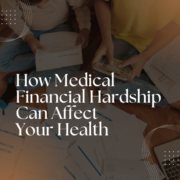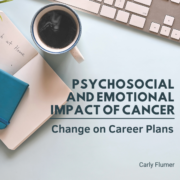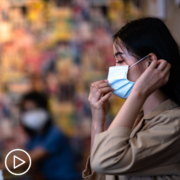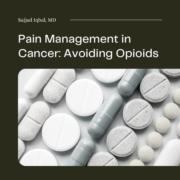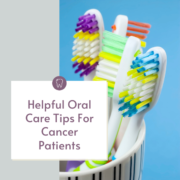How Medical Financial Hardship Can Affect Your Health
How Does Your Finances Affect Your Health?
In 2002, my husband was diagnosed with MGUS, a precursor to Multiple Myeloma. As many of you have also experienced, your life changes. At diagnosis, you probably felt you couldn’t breathe or process. All you could think of for days was cancer, cancer. And if you have been unfortunate enough to witness someone else in your family or close circle of friends with cancer you could only relate to their experience or what you thought their experience was. Good or bad..
I’ve witnessed too many people in my family battle cancer. My brother with leukemia, my father with lung cancer, my great grandfather with prostate cancer and my husband with multiple myeloma. I watched my parents struggle with the cost of his care. My mother was the caregiver to my father and stopped working to care for him. That was difficult for her because her sustainable income became almost non-existent. Fortunately, it came at a time when all but one of my seven siblings were independent and on our own. This at least was less responsibility for my mom and dad to worry about. However, because he was in the hospital a lot, and she no longer had income coming in, we all covered her daily expenses, food, mortgage, gas, water, purchased her a more reliable car, home repairs etc. We became her failsafe. Many people are not so fortunate.
My mother never spoke of the emotional or financial stress of everything to any of us, but we knew it had to be difficult. We saw the strain on her health. Her weight changed. She had trouble sleeping. Her blood pressure soared and her arthritis was always troubling her. More so than usual. My siblings who lived near would spend time helping her care for dad, and within a week of his death she had to take care of her mother who was an amputee and had Alzheimer’s.
So, it’s really not at all surprising to learn that medical financial toxicity or stress could be linked to worst cancer survival. The effects are many. Unfortunately for those who live in rural areas, have low incomes, those who are minorities, the underinsured or uninsured you already have financial stress. An expensive illness like cancer makes it all the more difficult.
My husband had great insurance from his employer. I thought at first we wouldn’t have to worry about medical bills. That is until he was at first approved for coverage for a stem cell harvesting and transplant in another hospital out of network, because there wasn’t a specialist in KY. Right after the transplant we were told treatment wasn’t going to be covered by his insurance.. After 5 weeks in the hospital!!! He became very despondent and depressed could not eat or sleep. He began to suffer with other emotional and physical issues unrelated to the illness itself. Additionally healing from the transplant was difficult. Lesson learned, having good insurance does not shield you from financial stress.
An analysis of 25,000 cancer survivors showed that financial hardship had a significant association with premature death among cancer survivors, no matter their insurance coverage. And according to K. Robin Yabroff, PhD, MBA, of the American Cancer Society in Kennesaw, GA and colleagues, almost 30% of patients ages 18-64 reported financial toxicity, which is associated with a 17% excess mortality risk compared with same-aged patients who did not report medical hardship.
In older patients, they found that financial hardship was less common with a 14% excess mortality risk. Having insurance did reduce the risk but not by much and certainly didn’t eliminate it.
An earlier study in the Journal of the National Cancer Institute found an increased mortality risk in cancer survivors who filed for bankruptcy. Though the number filing was low, medical financial hardship covers a range of economic stressors.
Some of the financial hardships associated with financial stress included; patients not adhering to or even forgoing treatment. Having problems paying for expensive prescriptions could lead to not taking medicine as prescribed to make it last longer or not getting it filled at all, In addition mental health counseling and other health issues are neglected.
How to mitigate a lot of the financial stressors that can lead to higher mortality?
Understand your illness and all aspects of your treatment. Ask your doctor to refer you to someone in the facility who can help you find financial assistance to help you manage the costs of your care and help you manage your everyday expenses. A quick google search can help you locate local, state and federal resources that may be available to you. Seek out help from organizations such as American Cancer Society, Leukemia and Lymphoma Society. There are many others. Get help with finances and budgeting CoPatient is a great organization that can determine of medical bills over $500 are accurate and fight that battle for you. Triage Cancer is a great resource to help you understand legal, and insurance information based on your state of residence.
The main takeaway is, you need to focus on healing and staying healthy. Seek out help regarding your finances so that you won’t find yourself in a financial crisis. Support groups are great sources of information.
Don’t be afraid to ask. Your health depends on it!

Diahanna Vallentine, BCPA, Financial Empowerment Lead
In 2002 Diahanna and her husband received the news that her husband had MGUS, a precursor to Multiple Myeloma. Upon her husband death in 2013, Diahanna immediately decided to make it her mission to help patients and caregivers empower themselves to speak up and to position themselves as partners in their treatment. Diahanna became a Board-Certified Patient Advocate. She is currently the Financial Myeloma Coach for The Myeloma Crowd Foundation.

